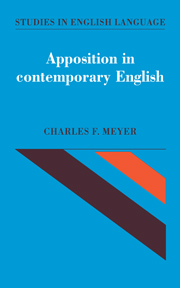Book contents
- Frontmatter
- Contents
- List of figures
- Preface
- 1 Apposition as a grammatical relation
- 2 The syntax of apposition
- 3 The semantics of apposition
- 4 The pragmatics of apposition
- 5 Apposition in the grammar of English
- Appendix 1 Grammatical tags
- Appendix 2 Appositions in individual samples of the corpora
- Notes
- References
- Index
4 - The pragmatics of apposition
Published online by Cambridge University Press: 20 November 2009
- Frontmatter
- Contents
- List of figures
- Preface
- 1 Apposition as a grammatical relation
- 2 The syntax of apposition
- 3 The semantics of apposition
- 4 The pragmatics of apposition
- 5 Apposition in the grammar of English
- Appendix 1 Grammatical tags
- Appendix 2 Appositions in individual samples of the corpora
- Notes
- References
- Index
Summary
The two previous chapters detailed, respectively, the syntactic and semantic characteristics of units in apposition. In this chapter, the emphasis will be the pragmatic characteristics of apposition.
Thematically, apposition is a relation in which the second unit of the apposition either wholly or partially provides new information about the first unit (4.1), new information that can be optionally introduced by a marker of apposition (4.2). Because appositions have this thematic characteristic, they are better suited to some contexts than to others and were therefore distributed differently across the genres of the corpora. In general, appositions occurred most frequently in those genres (such as press reportage) in which there was a communicative need for new information to be provided about the first unit of the apposition (4.3). In addition, certain types of appositions occurred more frequently in some genres than in others (4.4) because certain kinds of appositions (e.g. those within the semantic class of paraphrase) are communicatively more necessary in some genres (e.g. spontaneous conversation) than in others (e.g. fiction).
The thematic characteristics of units in apposition
Semantically, apposition is a relation whose units are related by various kinds of equivalence (3.4): referentially, for instance, the two units of an apposition can exhibit exact equivalence (coreference) or partial equivalence (part/whole relations). Thematically, however, the units of an apposition are characterized by various degrees of non-equivalence: the second unit of an apposition is not equivalent to the first unit but rather either wholly or partially provides new information about the first unit.
- Type
- Chapter
- Information
- Apposition in Contemporary English , pp. 92 - 122Publisher: Cambridge University PressPrint publication year: 1992



